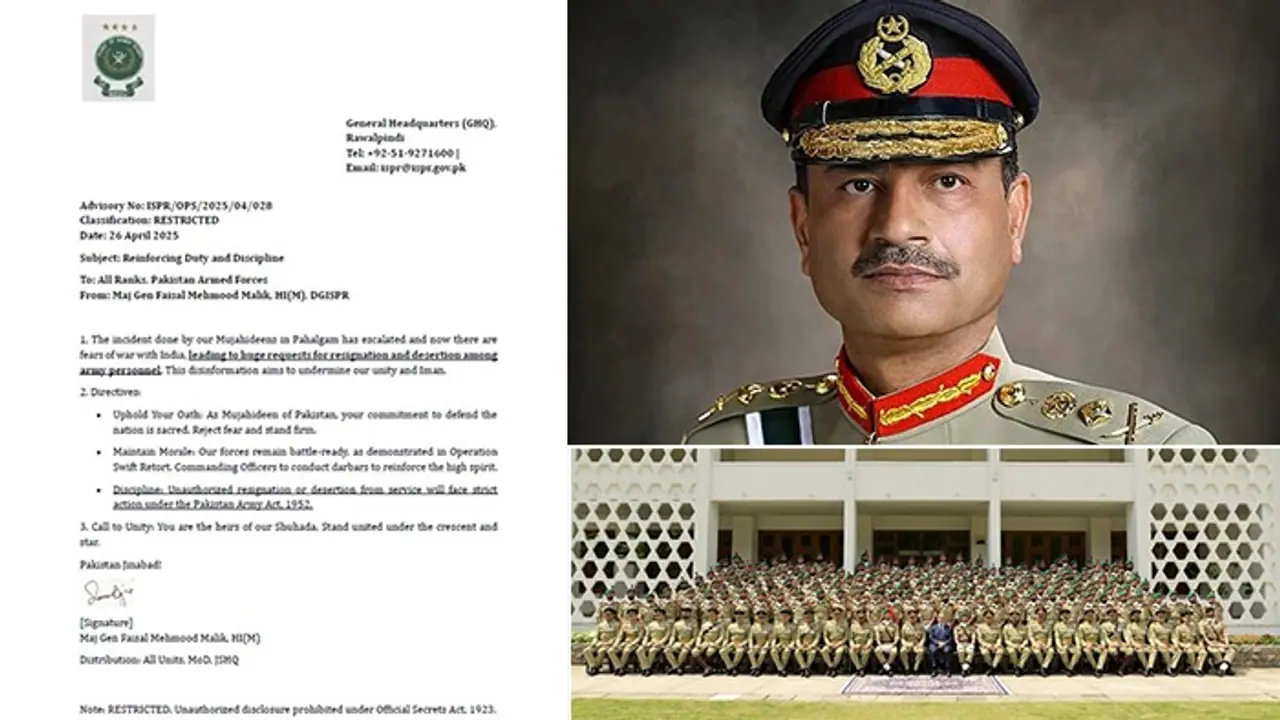Pakistan Army has purportedly issued stern warning against desertion following the Pahalgam attack, amid rising fears of war with India.
Amid soaring tensions with India following the Pahalgam terror attack that left 26 civilians dead, including two foreign nationals, the Pakistan Army has allegedly issued a strict advisory to its personnel, warning against desertion and urging them to uphold discipline and unity. The purported advisory from Pakistan's Inter-Services Public Relations (ISPR), marked “Restricted” and dated April 26, 2025, has gone viral on social media, although its authenticity remains unverified.

The document, purportedly signed by Major General Faisal Mehmood Malik, Director General of ISPR, was circulated widely on social media on Monday. The alleged advisory, addressed to "All Ranks, Pakistan Armed Forces," reaffirmed the importance of the military's commitment to defending the nation. The purported memo also stressed that the "incident done by our Mujahideens in Pahalgam" should not divide the army’s unity and morale.
The alleged ISPR memo also called on Pakistani military personnel to "reject fear and stand firm" and reminded them of their sacred oath to defend Pakistan. It also reinforced that any unauthorized resignations or desertions would face strict penalties under the Pakistan Army Act, 1952.
"You are the heirs of our Shuhada. Stand united under the crescent and star," the alleged document declares, in what appears to be a rallying cry to reinforce loyalty amid a growing atmosphere of fear over a outbreak of war with India.
Please note: Asianet News cannot independently authenticate the veracity of the viral document.
Where is Pakistan Army Chief General Syed Asim Munir?
The unverified document by ISPR surfaced amid increasing speculation about the whereabouts of Pakistan’s Army Chief, General Syed Asim Munir, following rumours that he was either ‘missing’ or ‘hiding’ in a bunker in Rawalpindi. These rumours, which were quickly amplified by social media, coincided with heightened war rhetoric from both sides.
The Pakistani government attempted to douse the flames on Sunday by releasing a photograph showing General Munir alongside Prime Minister Shehbaz Sharif at a commissioning event at PMA Kakul in Abbottabad. The image, dated April 26, was seen as a calculated attempt to counter rumours of his disappearance.
However, behind the scenes, reports indicate deep unrest within Pakistan's military ranks. Several unverified reports claim General Munir has relocated his family abroad, while several senior officers have reportedly moved their families to safer locations in Britain and New Jersey via private jets.
Tensions have been further inflamed by reported internal discord over Munir’s recent controversial speech on India-Pakistan partition and Hindu-Muslim issues. A senior general — said to be senior in rank to Munir but sidelined for the top job — has reportedly accused the army chief of inciting extremist groups through his remarks, indirectly blaming him for the Pahalgam massacre. This senior officer, stationed at GHQ Rawalpindi, is believed to have expressed strong objections internally, worsening fissures within the powerful military establishment.
The backdrop to this turmoil is India's aggressive diplomatic and military response to the Pahalgam attack. On April 23, India announced a series of punitive measures against Pakistan, including the suspension of the Indus Water Treaty, a move that drew sharp reactions from Islamabad, with one minister issuing nuclear threats against New Delhi.
As Indian security forces ramp up counter-terror operations across Kashmir, signs of reported internal strife in Pakistan — underscored by the viral ISPR advisory and mounting questions over its military leadership — signal turbulent days ahead for already strained India-Pakistan relations.


